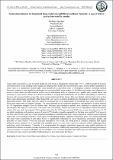| dc.description.abstract | Clean water accessibility is vital to human health and well-being, a fundamental human right. Over 1.7 billion people do not have consistent access to safe drinking water, negatively affecting their health and socioeconomic status. Despite global recognition of clean water as a fundamental human right, many households in peri-urban areas of developing countries, including northern Tanzania, continue to face significant challenges in accessing reliable water sources. In the Kikwe peri-urban ward, disparities in access to clean water are influenced by various social determinants such as education level, gender roles, marital status, and proximity to water sources. These social factors contribute to unequal water distribution and increased vulnerability to waterborne diseases and economic burdens, especially among women and marginalized groups. However, limited empirical data exists on how these social determinants specifically affect household water access in Kikwe, hindering the development of targeted, evidence-based interventions. This study, therefore, aimed to investigate the social determinants of household clean water accessibility in Kikwe peri-urban ward of northern Tanzania. The cross-sectional survey combined quantitative and qualitative research methods on 353 respondents sampled from the Kikwe ward. Inference and descriptive statistics were employed to analyze the social determinants and respective associations with clean water accessibility. Results show that 64% of respondents finished elementary school, 53% were male, the majority 25.8% aged between 45 to 54, 73.7% were married, 37.4% rely on water from the rivers, 33.7% use public standpipes as the primary source of water, 62.9% female primarily responsible for fetching water and 84.7% of users do not treat water for their daily use. A weak significant correlation existed between water sources and social variables tested, implying clean water is an essential commodity, which needs to be distributed equally regardless of individual status. The findings highlight that clean water accessibility in peri-urban Kikwe is significantly influenced by social inequalities, particularly gender, and proximity to water sources. While the statistical correlations were weak, the trends point to systemic disparities that require deliberate policy attention. It is concluded that equitable access to clean water cannot be achieved without addressing these underlying social determinants. Therefore, it is recommended that targeted educational programs using mobile platforms be introduced to enhance awareness on water treatment and conservation. Additionally, empowering communities through participatory water governance, investing in affordable and decentralized water treatment solutions, and improving local infrastructure is critical for long-term water security and public health resilience in peri-urban areas like Kikwe. | en_US |

